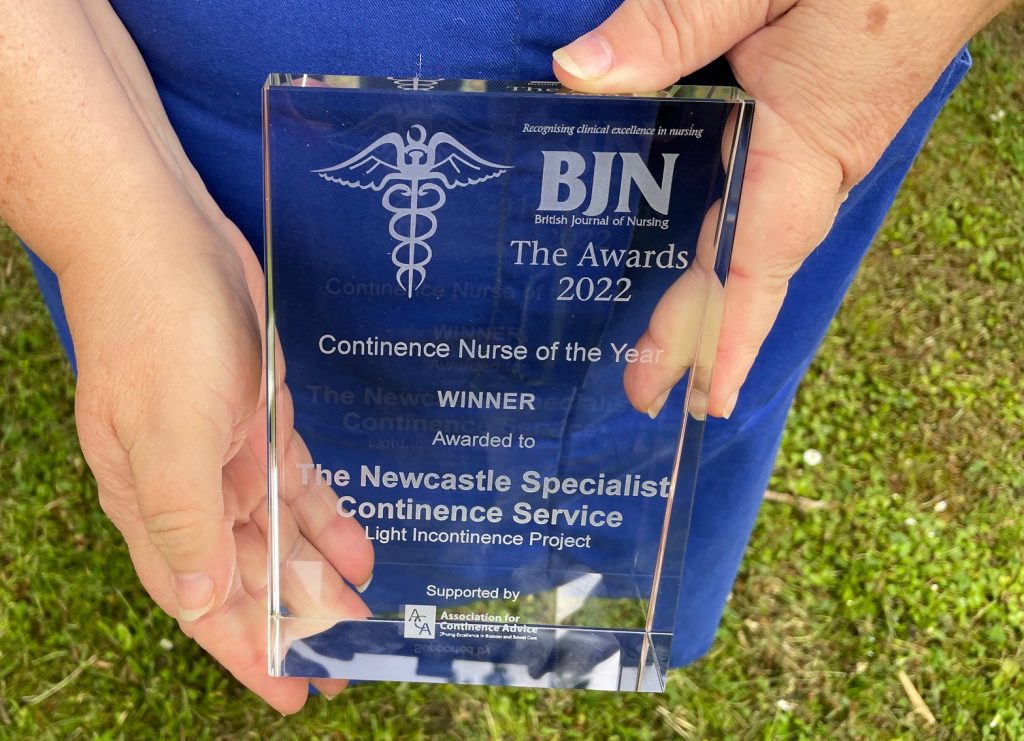Newcastle’s specialist continence nursing team have been named winners for this year’s British Journal of Nursing ‘Continence Nurse of the Year’ Award.
The jubilant team were recognised for their Light Urinary Incontinence Project (LiP) with a core focus on good bladder healthcare and reducing the reliance on containment products whilst improving quality of life for patients and their loved ones.
Community Lead for Newcastle’s Specialist Continence Service Alyson Laws explains: “The main driver for our project was to demonstrate that people shouldn’t have to tolerate their condition by wearing products 24/7. Patients should be offered an assessment, with alternative treatment options considered before prescribing any products.”
The team’s LiP work started in November 2020 and to date the evaluations and feedback received has been extremely positive.
Watch this video to find out more about Newcastle’s Award Winning Specialist Continence Service
Bespoke clinics key to better patient experience and quality of life
Alyson continues: “We’re delighted to be able to successfully show that by offering a bespoke continence clinic for light urinary continence we can give patients a much better experience and ultimately improve their quality of life.”
“We feel really proud to have received this award recognising our passion and motivation to improve the experience for people with urinary continence issues,” adds Jackie Rees, Nurse Consultant for Continence.
“This has been a true team effort including our wonderful admin staff, with invaluable support from our senior nursing team and quality improvement colleagues who believed in and supported our vision.”

Supporting patients to make informed choices
The team’s LiP project is a prime example of our commitment to supporting patients to make informed choices about their health and wellbeing whilst continually learning from their experience to improve quality of care and the services we provide – in our hospitals, our outreach clinics and in the community.
Continence problems affect millions of people’s lives
The NHS estimate that between 3-6 million people in the UK suffer with some degree of urinary incontinence.
There are lots of reasons why people experience these symptoms which can be upsetting and affect people’s quality of life, yet there are a number of treatments and exercises available which, if followed properly and regularly, can be truly lifechanging.
“Following an assessment including a pelvic floor examination, a number of options can usually be recommended”, says Sarah Killeen, the Nurse Specialist who has delivered the light urinary incontinence clinics.
“These may be appropriate pelvic floor strengthening, effective bladder retraining, improvement with frequency of voiding through voiding techniques. We also promote and advise on the importance of hydration with a key focus on the “2H’s” – hydration and hygiene.”
Sarah and her colleague Alyson also developed a set of guidelines and competencies to be followed in the community which supports the project.
City-wide project
Their project involved 29 GP practices and 20 District Nursing teams with 47 members of community based healthcare staff undergoing formal training to be able to carry out the pelvic floor assessments and instigate the appropriate treatments.
Of the 764 people approached during the project, 268 (35%) accepted the offer of an assessment and 203 have been discharged to date after levels 1-3 treatment, with improvements made to the management of their condition or without the need for any containment products, resulting in considerable savings.
The patient pathway is now much improved with patients referred directly to the light urinary continence clinic.
Positive feedback showed how important compassion and encouragement to patients and their carers can be as continence issues receive a negative stigma, and many patients are unable to resume normal activities. Comments included:
- “Able to take my children out on long walks without worrying where the toilet is – thank you”
- “I can socialise with friends again, rather than avoiding going out”
- “Your intervention has allowed looking after my wife much easier and has resulted in us both getting a lot more sleep”
- “It is useful to have someone holding me accountable for making improvements to my health”
- “Having someone take an interest in this part of my health is refreshing, it is good to talk about it as I don’t normally talk about it with anyone”
Early assessment and treatment reaps positive results
“The LiP project is patient focused so receiving such positive feedback is great to see and shows that by ensuring first line approaches towards assessment and treatment are considered, you can get really positive results,” says Sarah.
“We also found that by adopting quality improvement (QI) theories and methodology to our clinical practice project, we benefited from a structured approach which helped us to focus when monitoring the interventions and providing clarity to future work.”
Congratulations to the team.
